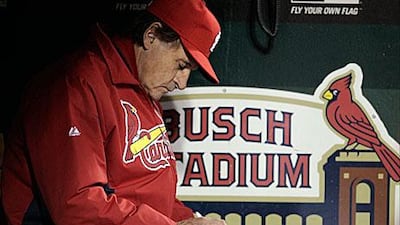The World Series trophy is back in one of America's last real baseball towns for the 11th time in the history of the game, thanks to a St Louis Cardinals team that was given up for dead just 24 hours before they claimed the championship.
Then again, many people gave up on them much earlier than that - even Bud Selig, the baseball commissioner.
An hour or so before St Louis finally shook free of the Texas Rangers with a 6-2 victory in Game 7 of the World Series, Selig remembered a meeting in his Milwaukee office with Tony La Russa, the Cardinals manager, two months earlier.
At the time, St Louis trailed the Brewers by ten-and-a-half games in the National League Central and the Cardinals' chances of catching the Atlanta Braves for the wild card were equally bleak.
Selig remembered searching for a way to soothe one of the most competitive men he has ever met.
"I congratulated him on his great year," the commissioner said. But he was not expecting what came next.
La Russa, dead-serious, said, "We're not done."
"And," the commissioner said, "he wasn't kidding."
Far from it.
"If you watch the history of baseball, teams come back, and sometimes they could have come back but they give in or give up. And I knew the character on our team," La Russa said. "We started winning some games, regained some respect, and then it got better. ... They just grabbed every game like it's the last game."
In his 16th season in charge in St Louis, and nearing his fifth decade in the game, La Russa won his third World Series title and second in six seasons. The three championships tie him with Sparky Anderson, Miller Huggins and John McGraw, and just like that trio and the handful of managers ahead of them, it practically guarantees entrance to the Hall of Fame.
Yet this one was not about posterity, but vulnerability.
About how La Russa kept moving around all the parts on a team that refused to fit together - until all of a sudden, it did. Feelings were bruised in the process, starters got benched and utility men learned new positions. Four pitchers were thrown into the mix right around the trading deadline.
As a result, La Russa probably spent more time tinkering with his bullpen than ever before. Considering his obsession with getting lefty-righty matchups and the converse, that's saying a lot.
La Russa did not settle on Jason Motte - who got the final out in Game 7 - as his closer until mid-August, and even then, the manager refused to officially hand him the title.
That bit of uncertainty, coupled with all the moves that preceded it over the course of the season, opened La Russa to more second-guessing than ever.
It reached a crescendo in a loss at Texas in Game 5 after a botched hit-and-run called by Albert Pujols from the batter's box, followed by two phone calls by La Russa to the bullpen that failed to get the reliever he wanted on the mound.
There was speculation that the pressure forced the mistake or that the 67-year-old La Russa had lost his edge.
"That kind of stuff would have bothered me, but Tony's different" Joe Pettini, the Cardinals bench coach, said. "He's not afraid to make a mistake; never has been.
"He loves to say, 'No guts, no glory' but he also tells guys, 'You got a question about how things are handled, the door to the office is always open. Just ask it.'
"The answer might not be what you're looking for, but he's always got one."
Even with a four-run lead in Game 7, La Russa was sketching out an end game about what to do if Motte, a right-hander, was shaky in trying to close out the game and the Rangers sent up a few left-handed hitters.
His plan was to move Motte from the mound to the outfield, bring in left-hander Marc Rzepczynski to pitch to the Rangers' left-handers, then bring Motte back to pitch to the right-handers.
"I don't know if I'd do it," he said. "I've never done it before in my life."
The one thing La Russa knew for certain is that he would not be dissuaded by the risk.
"When you're doing all that, you know it can get away from you, and that's part of the stress of those last innings," he said, "because it's a real small margin getting those last outs."
When the final one came, fans who had been outside the ballpark streamed inside. After watching their team survive two elimination games against the Philadelphia Phillies at the start of the play-offs, then two more against the Rangers - twice down to their last strike in Game 6 - the fans were determined to throw themselves a party.
La Russa and his ballclub can finally do the same.

